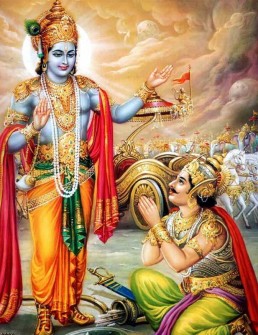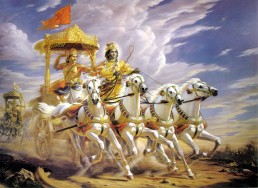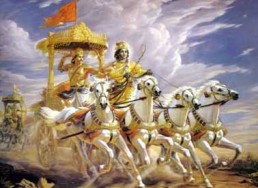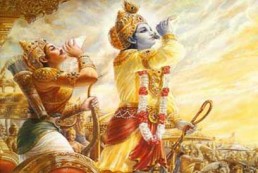Bhagavad Gita-Chapter 9 All Verses with Meaning and Audio
इदं तु ते गुह्यतमं प्रवक्ष्याम्यनसूयवे ।
ज्ञानं विज्ञानसहितं यज्ज्ञात्वा मोक्ष्यसेऽशुभात् ॥ ९-१॥
idaṃ tu te guhyatamaṃ pravakṣyāmyanasūyave
jñānaṃ vijñānasahitaṃ yajjñātvā mokṣyase’śubhāt 9-1
प्रत्यक्षावगमं धर्म्यं सुसुखं कर्तुमव्ययम् ॥ ९-२॥
pratyakṣāvagamaṃ dharmyaṃ susukhaṃ kartumavyayam 9-2
अप्राप्य मां निवर्तन्ते मृत्युसंसारवर्त्मनि ॥ ९-३॥
aprāpya māṃ nivartante mṛtyusaṃsāravartmani 9-3
मत्स्थानि सर्वभूतानि न चाहं तेष्ववस्थितः ॥ ९-४॥
matsthāni sarvabhūtāni na cāhaṃ teṣvavasthitaḥ 9-4
भूतभृन्न च भूतस्थो ममात्मा भूतभावनः ॥ ९-५॥
bhūtabhṛnna ca bhūtastho mamātmā bhūtabhāvanaḥ 9-5
तथा सर्वाणि भूतानि मत्स्थानीत्युपधारय ॥ ९-६॥
tathā sarvāṇi bhūtāni matsthānītyupadhāraya 9-6
कल्पक्षये पुनस्तानि कल्पादौ विसृजाम्यहम् ॥ ९-७॥
kalpakṣaye punastāni kalpādau visṛjāmyaham 9-7
भूतग्राममिमं कृत्स्नमवशं प्रकृतेर्वशात् ॥ ९-८॥
bhūtagrāmamimaṃ kṛtsnamavaśaṃ prakṛtervaśāt 9-8
उदासीनवदासीनमसक्तं तेषु कर्मसु ॥ ९-९॥
udāsīnavadāsīnam asaktaṃ teṣu karmasu 9-9
हेतुनानेन कौन्तेय जगद्विपरिवर्तते ॥ ९-१०॥
hetunānena kaunteya jagadviparivartate 9-10
परं भावमजानन्तो मम भूतमहेश्वरम् ॥ ९-११॥
paraṃ bhāvamajānanto mama bhūtamaheśvaram 9-11
राक्षसीमासुरीं चैव प्रकृतिं मोहिनीं श्रिताः ॥ ९-१२॥
rākṣasīmāsurīṃ caiva prakṛtiṃ mohinīṃ śritāḥ 9-12
भजन्त्यनन्यमनसो ज्ञात्वा भूतादिमव्ययम् ॥ ९-१३॥
bhajantyananyamanaso jñātvā bhūtādimavyayam 9-13
नमस्यन्तश्च मां भक्त्या नित्ययुक्ता उपासते ॥ ९-१४॥
namasyantaśca māṃ bhaktyā nityayuktā upāsate 9-14
एकत्वेन पृथक्त्वेन बहुधा विश्वतोमुखम् ॥ ९-१५॥
ekatvena pṛthaktvena bahudhā viśvatomukham 9-15
मन्त्रोऽहमहमेवाज्यमहमग्निरहं हुतम् ॥ ९-१६॥
mantro’hamahamevājyam ahamagnirahaṃ hutam 9-16
वेद्यं पवित्रमोङ्कार ऋक्साम यजुरेव च ॥ ९-१७॥
vedyaṃ pavitramoṅkāra ṛksāma yajureva ca 9-17
प्रभवः प्रलयः स्थानं निधानं बीजमव्ययम् ॥ ९-१८॥
prabhavaḥ pralayaḥ sthānaṃ nidhānaṃ bījamavyayam 9-18
अमृतं चैव मृत्युश्च सदसच्चाहमर्जुन ॥ ९-१९॥
amṛtaṃ caiva mṛtyuśca sadasaccāhamarjuna 9-19
यज्ञैरिष्ट्वा स्वर्गतिं प्रार्थयन्ते ।
ते पुण्यमासाद्य सुरेन्द्रलोक-
मश्नन्ति दिव्यान्दिवि देवभोगान् ॥ ९-२०॥
yajñairiṣṭvā svargatiṃ prārthayante
te puṇyamāsādya surendraloka-
maśnanti divyāndivi devabhogān 9-20
क्षीणे पुण्ये मर्त्यलोकं विशन्ति ।
एवं त्रयीधर्ममनुप्रपन्ना
गतागतं कामकामा लभन्ते ॥ ९-२१॥
kṣīṇe puṇye martyalokaṃ viśanti
evaṃ trayīdharmamanuprapannā
gatāgataṃ kāmakāmā labhante 9-21
तेषां नित्याभियुक्तानां योगक्षेमं वहाम्यहम् ॥ ९-२२॥
teṣāṃ nityābhiyuktānāṃ yogakṣemaṃ vahāmyaham 9-22
तेऽपि मामेव कौन्तेय यजन्त्यविधिपूर्वकम् ॥ ९-२३॥
te’pi māmeva kaunteya yajantyavidhipūrvakam 9-23
न तु मामभिजानन्ति तत्त्वेनातश्च्यवन्ति ते ॥ ९-२४॥
na tu māmabhijānanti tattvenātaścyavanti te 9-24
भूतानि यान्ति भूतेज्या यान्ति मद्याजिनोऽपि माम् ॥ ९-२५॥
bhūtāni yānti bhūtejyā yānti madyājino’pi mām 9-25
तदहं भक्त्युपहृतमश्नामि प्रयतात्मनः ॥ ९-२६॥
tadahaṃ bhaktyupahṛtamaśnāmi prayatātmanaḥ 9-26
यत्तपस्यसि कौन्तेय तत्कुरुष्व मदर्पणम् ॥ ९-२७॥
yattapasyasi kaunteya tatkuruṣva madarpaṇam 9-27
संन्यासयोगयुक्तात्मा विमुक्तो मामुपैष्यसि ॥ ९-२८॥
saṃnyāsayogayuktātmā vimukto māmupaiṣyasi 9-28
ये भजन्ति तु मां भक्त्या मयि ते तेषु चाप्यहम् ॥ ९-२९॥
ye bhajanti tu māṃ bhaktyā mayi te teṣu cāpyaham 9-29
साधुरेव स मन्तव्यः सम्यग्व्यवसितो हि सः ॥ ९-३०॥
sādhureva sa mantavyaḥ samyagvyavasito hi saḥ 9-30
कौन्तेय प्रतिजानीहि न मे भक्तः प्रणश्यति ॥ ९-३१॥
kaunteya pratijānīhi na me bhaktaḥ praṇaśyati 9-31
स्त्रियो वैश्यास्तथा शूद्रास्तेऽपि यान्ति परां गतिम् ॥ ९-३२॥
striyo vaiśyāstathā śūdrāste’pi yānti parāṃ gatim 9-32
अनित्यमसुखं लोकमिमं प्राप्य भजस्व माम् ॥ ९-३३॥
anityamasukhaṃ lokamimaṃ prāpya bhajasva mām 9-33
मामेवैष्यसि युक्त्वैवमात्मानं मत्परायणः ॥ ९-३४॥
ॐ तत्सदिति श्रीमद्भगवद्गीतासूपनिषत्सु
ब्रह्मविद्यायां योगशास्त्रे श्रीकृष्णार्जुनसंवादे
राजविद्याराजगुह्ययोगो नाम नवमोऽध्यायः ॥ ९॥
māmevaiṣyasi yuktvaivamātmānaṃ matparāyaṇaḥ 9-34
oṃ tatsaditi śrīmadbhagavadgītāsūpaniṣatsu
brahmavidyāyāṃ yogaśāstre śrīkṛṣṇārjunasaṃvāde
rājavidyārājaguhyayogo nāma navamo’dhyāyaḥ 9

Description
Bhagavad Gita Chapter 9 Summary
Rājavidyā-rājaguhya-yoga – The Royal Secret
The previous chapter was a brief digression into techniques of saguna-upasana which is not the main theme of the Gita. Here the Lord continues the teaching as it was given in the 7th chapter and reiterates and expounds on those matters. He again points out that those who seek mere materialistic results can gain those by His grace but anyone who desires Him alone will merge with Him, regardless of their worldly conditionings based on gender, birth etc. Below are the main themes of Chapter 9:
Verses 1 – 3
Introduction to the knowledge, its glory and necessary qualifica-tions
Verses 4 – 10
Nature of God
Verses 11
Cause of bondage
Verses 12 – 19
Atheists, theists and types of upāsanā
Verses 20 – 29
Sakāma-bhaktas and niṣkāma-bhaktas
Verses 30 – 34
Glory of bhakti
Gita Chapter 9 – Commentary by Swami Paramarthananda
Background
In the previous three chapters, Lord Krishna revealed God as the ma-terial cause of the universe. Since the effect cannot be different from the material cause, it clearly follows that the universe cannot be different from God. Thus the entire universe is the divine manifestation of God. Hence whatever glories we see in the creation belong to the Lord alone. Krishna reveals this idea in this chapter as the culmination of his teaching of Virāṭ (Viśvarūpam).
In the first three verses, Krishna introduces the topic of vibhūti and yoga — vibhūti is the manifestation of Lord and yoga is the power of manifestation. Even great sages cannot talk about the glories of the Lord, because they are finite beings born later. Hence it is the rarest knowledge that is given. One who gains this knowledge will be free from saṃsāra (1 to 3).
In the next four verses, the Lord reveals His glory by pointing out that the entire subtle universe of thoughts as well as the gross universe are born of Him. The seven great sages, the four sages Sanaka etc., and the Manus are all born of the mind of the Lord. One who knows this attains self-knowledge ultimately (4 to 7).
The following four verses deal with the Virāṭ-devotees and the benefits of such a devotion. The devotees accept everything as a gift of God, because God is the source of all. They think about God, speak about God, hear about God — in short they spend their lives revelling in God all the time (8, 9). (Still they are saguṇa-devotees only. They are ignorant of the highest nature of the Lord.) The Lord says that He takes the responsibility of enlightening them. Out of compassion for them, the Lord lights up the lamp of knowledge, remaining in their heart. (The idea is that the Lord will provide them with a guru and the necessary conditions for the knowledge of the highest nature of God.) (10, 11)
In the next seven verses (12 to 18), Arjuna requests Krishna to give the details of His glories (manifestations) which will help him in upāsanā. (Each expression of God in the universe can become a symbol for upāsanā. Later, when see every glory as the expression of God, it becomes the appreciation of Virāṭ. This helps in the expansion of the mind.]
From verse 19th to the end of the chapter, Bhagavān describes His glories. The Lord is careful to add both in the beginning and in the end that it is not an exhaustive list of His glories. They are the important ones. Nobody can exhaust the glories of the Lord (19, 40). Krishna begins the enumeration with the very Self. The best, the closest and the most evident expression of the Lord is the very ‘I’, the consciousness (20). Krishna concludes the list by pointing out that He is the very existence in all beings, because He is the material cause (bījam) of all (39). In short, whatever there is which is glorious, rich or powerful — all of them are the expressions of only a ray of God’s glory (41). In fact it is not that the Lord’s glory is in the world, but the entire world is in the Lord, occupying a part of Him, as it were (42). (The world cannot be a part of the Lord in the real sense of the term, because it is only apparent as the Lord Himself negates it in IX-5.)
Gita 9th Chapter – Main Points
Introduction and the glory of this knowledge: 1 to 3
Lord’s glory in brief and the benefit of that knowledge: 4 to 7
Virāṭ-devotees and the benefit of such a devotion: 8 to 11
Arjuna’s request for elaboration: 12 to 18
Lord’s glories elaborated: 19 to 42
Since the main theme of this chapter is the Lord’s glories, this chapter is called Vibhūti yoga.
Other Bhagavad Gita Shlokams
Bhagavad Gita
The Bhagavad Gita, or the Song of the Lord, is a dialogue between Krishna, an incarnation of Vishnu, and his friend and disciple, Arjuna. Composed of 701 Shlokas arranged in 18 chapters, the Gita is one of the best-known philosophical texts of…
Bhagavad Gita-Chapter 01 All Verses with Meaning and Audio
Bhagavad Gita Chapter 1 All Verses for easy chanting along with Audio and Meaning. Lyrics In English, Sanskrit, Hindi, Telugu, Tamil, Gujarati, Bengali and many more languages.
Bhagavad Gita-Chapter 02 All Verses with Meaning and Audio
Bhagavad Gita Chapter 2 All Verses for easy chanting along with Audio and Meaning. Lyrics In English, Sanskrit, Hindi, Telugu, Tamil, Gujarati, Bengali and many more languages.
Bhagavad Gita-Chapter 03 All Verses with Meaning and Audio
Bhagavad Gita Chapter 3 All Verses for easy chanting along with Audio and Meaning. Lyrics In English, Sanskrit, Hindi, Telugu, Tamil, Gujarati, Bengali and many more languages.
Bhagavad Gita-Chapter 04 All Verses with Meaning and Audio
Bhagavad Gita Chapter 4 All Verses for easy chanting along with Audio and Meaning. Lyrics In English, Sanskrit, Hindi, Telugu, Tamil, Gujarati, Bengali and many more languages.
Bhagavad Gita-Chapter 05 All Verses with Meaning and Audio
Bhagavad Gita Chapter 5 All Verses for easy chanting along with Audio and Meaning. Lyrics In English, Sanskrit, Hindi, Telugu, Tamil, Gujarati, Bengali and many more languages.
Bhagavad Gita-Chapter 06 All Verses with Meaning and Audio
Bhagavad Gita Chapter 6 All Verses for easy chanting along with Audio and Meaning. Lyrics In English, Sanskrit, Hindi, Telugu, Tamil, Gujarati, Bengali and many more languages.
Bhagavad Gita-Chapter 07 All Verses with Meaning and Audio
Bhagavad Gita Chapter 7 All Verses for easy chanting along with Audio and Meaning. Lyrics In English, Sanskrit, Hindi, Telugu, Tamil, Gujarati, Bengali and many more languages.
Bhagavad Gita-Chapter 08 All Verses with Meaning and Audio
Bhagavad Gita Chapter 8 All Verses for easy chanting along with Audio and Meaning. Lyrics In English, Sanskrit, Hindi, Telugu, Tamil, Gujarati, Bengali and many more languages.
Bhagavad Gita-Chapter 10 All Verses with Meaning and Audio
Bhagavad Gita Chapter 10 All Verses for easy chanting along with Audio and Meaning. Lyrics In English, Sanskrit, Hindi, Telugu, Tamil, Gujarati, Bengali and many more languages.
Bhagavad Gita-Chapter 11 All Verses with Meaning and Audio
Bhagavad Gita Chapter 11 All Verses for easy chanting along with Audio and Meaning. Lyrics In English, Sanskrit, Hindi, Telugu, Tamil, Gujarati, Bengali and many more languages.
Bhagavad Gita-Chapter 12 All Verses with Meaning and Audio
Bhagavad Gita Chapter 12 All Verses for easy chanting along with Audio and Meaning. Lyrics In English, Sanskrit, Hindi, Telugu, Tamil, Gujarati, Bengali and many more languages.
Bhagavad Gita-Chapter 13 All Verses with Meaning and Audio
Bhagavad Gita Chapter 13 All Verses for easy chanting along with Audio and Meaning. Lyrics In English, Sanskrit, Hindi, Telugu, Tamil, Gujarati, Bengali and many more languages.
Bhagavad Gita-Chapter 14 All Verses with Meaning and Audio
Bhagavad Gita Chapter 14 All Verses for easy chanting along with Audio and Meaning. Lyrics In English, Sanskrit, Hindi, Telugu, Tamil, Gujarati, Bengali and many more languages.
Bhagavad Gita-Chapter 15 All Verses with Meaning and Audio
Bhagavad Gita Chapter 15 All Verses for easy chanting along with Audio and Meaning. Lyrics In English, Sanskrit, Hindi, Telugu, Tamil, Gujarati, Bengali and many more languages.
Bhagavad Gita-Chapter 16 All Verses with Meaning and Audio
Bhagavad Gita Chapter 16 All Verses for easy chanting along with Audio and Meaning. Lyrics In English, Sanskrit, Hindi, Telugu, Tamil, Gujarati, Bengali and many more languages.
Bhagavad Gita-Chapter 17 All Verses with Meaning and Audio
Bhagavad Gita Chapter 17 All Verses for easy chanting along with Audio and Meaning. Lyrics In English, Sanskrit, Hindi, Telugu, Tamil, Gujarati, Bengali and many more languages.
Bhagavad Gita-Chapter 18 All Verses with Meaning and Audio
Bhagavad Gita Chapter 18 All Verses for easy chanting along with Audio and Meaning. Lyrics In English, Sanskrit, Hindi, Telugu, Tamil, Gujarati, Bengali and many more languages.
Gita Dhyanam
The Gītā Dhyānam, also called the Gītā Dhyāna or the Dhyāna Ślokas associated with the Gītā, is a 9-verse Sanskrit poem that has often been attached to the Bhagavad Gita, one of the most important scr
Bhagavad Gita-Chapter 9 All Verses with Meaning and Audio – Bhagavad Gita – Bhagavad Gita Chapter 9 All Verses Easy Chanting with Audio and Meaning, Lyrics




